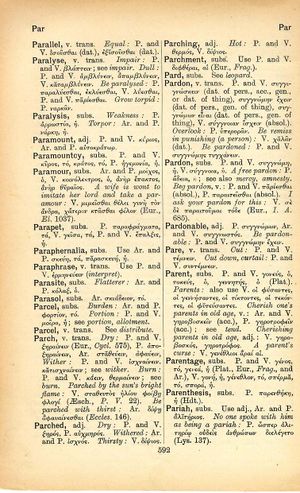paralysis: Difference between revisions
εἰ ἔρρωσαι καὶ ἐν τοῖς ἄλλοις ἀλύπως ἀπαλλάσσεις → if you are well and in other respects are getting on without annoyance
m (Text replacement - "(|thumb)\n(\|link=)" to "$1$2") |
m (Woodhouse1 replacement) |
||
| Line 1: | Line 1: | ||
{{Woodhouse1 | {{Woodhouse1 | ||
|Text=[[File:woodhouse_592.jpg|thumb|link={{filepath:woodhouse_592.jpg}}]] | |Text=[[File:woodhouse_592.jpg|thumb|link={{filepath:woodhouse_592.jpg}}]] | ||
===substantive=== | |||
[[weakness]]: [[prose|P.]] [[ἀρρωστία]], ἡ. | |||
[[torpor]]: [[Aristophanes|Ar.]] and [[prose|P.]] [[νάρκη]], ἡ. | |||
}} | }} | ||
{{Lewis | {{Lewis | ||
Revision as of 09:11, 20 May 2020
English > Greek (Woodhouse)
substantive
Latin > English (Lewis & Short)
părălysis: is, f., = παράλυσις,
I palsy, paralysis: paralysi mederi, Plin. 20, 3, 8, § 14: paralysi periclitari, id. 20, 15, 59, § 165: adulescens, paralysin cave, Petr. 120; Vulg. 1 Macc. 9, 55.
Latin > French (Gaffiot 2016)
părălўsis, is, f. (παράλυσις),
1 paralysie d’un côté du corps : Plin. 20, 14 ; 20, 165
2 [chez les haruspices] explication : Fulg. Myth. 3, 10.
Latin > German (Georges)
paralysis, is u. eos, Akk. in, Abl. i, f. (παράλυσις), I) als mediz. t. t., die Lähmung der Nerven an einer Seite des Körpers, die Paralyse, der Schlagfluß, rein lat. nervorum resolutio od. remissio, Plin. u.a. – II) als t. t. der Haruspizin, die Auflösung, Erklärung, Fulg. myth. 3, 10.
Latin > English
paralysis paralysis N F :: paralysis; any of several forms of paralysis; apoplexy; palsy (L+S)
paralysis paralysis paralysos/is N F :: paralysis; any of several forms of paralysis; apoplexy; palsy (L+S)

